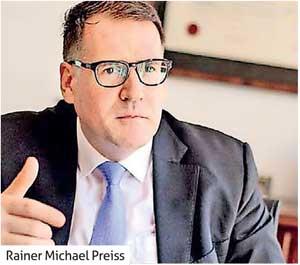21 Jan 2021 - {{hitsCtrl.values.hits}}
By Nishel Fernando
Sri Lanka presents a unique contrarian investment opportunity for global investors to diversify their risk exposure this year, despite the rating downgrades by global credit rating agencies, which were based on their standard financial models, according to the latest Economic and Market Outlook report of the Colombo-based Ceylon Asset Management (CAM).

“We strongly believe global investors should exploit this unique contrarian investment opportunity pertaining to Sri Lanka international sovereign bonds (ISBs) trading at deep discounted prices and diversify investor risk exposure to reap benefits in the near future,” the Research wing of CAM, led by its senior Economic Advisor Rainer Michael Preiss said.
Despite the current economic condition, the report noted that a contrarian behaviour has been emerging among the local investors, as they have become confident in the government policies and measures to reduce the trade deficit, strengthening the current account balance and its ability to settle the future external debt obligations while maintaining a healthy exchange rate.
In particular, the report highlighted that this contrarian behaviour among local investors elevated the Colombo Stock Exchange (CSE) to become the best-performing stock market in the world, as of January 15, despite the continued net foreign selling.
Further, the report predicted that the CSE has the potential to outperform other frontier equity markets during the year, since it is trading at attractive valuations.
“The ASPI is trading at a discount of 54 percent PER (price-to-earnings ratio) and 33 percent PBV (price-to-book-ratio) compared to its peer frontier market countries,” the report noted. It also highlighted that the CSE offers the lowest negative correlation in Asia, compared to India, the United States and Japan, presenting a unique opportunity for global investors to diversify equity risk exposure.
“Global investors seek markets that perform conversely to their primary markets, in order to mitigate volatility risk. Due to the CSE’s inverse relationship with other markets, Sri Lanka has the potential to offer the most advantageous risk reduction opportunity to global investors in 2021.”
The report recommended local investors, including state pensions funds, to exploit the current attractive valuations of the CSE before a credit rating revision and foreign investor confidence return to the CSE.
Meanwhile, the report acknowledged that foreign investors abandoned Sri Lankan securities, on the perception that the country is “likely to default on its debt obligations”, following the sovereign rating downgrade by international rating agencies to “CCC” alongside Iraq, Angola and Lebanon, which raised concerns on the country’s external debt repayment ability.
Sri Lanka’s ISB yields spiked to an all-time high level last year, since the first ISB issue in 2007. The 2030 ISB yield of 9 percent before the pandemic increased to 19.6 percent during May last year. Currently, it has recovered marginally and is trading at a yield of 16.3 percent.
However, the report emphasised that analysts remain optimistic on the pickup of foreign direct investment (FDI) inflows with the beginning of projects in the Colombo Port City and the construction of the investment and export zone in Hambantota.
In particular, it noted that the government’s move to offer 49 percent of equity ownership in the East Container Terminal (ECT) of the Colombo Port to an Indian conglomerate for an FDI of US $ 500 million, instead of obtaining a US $ 500 million loan to complete the project, as a positive development, which would help to keep the country’s debt dynamics in check.
Further, the report viewed that the cancellation of the Colombo Light Rail Transit (LRT) project may also contribute to reducing pressure on the country’s debt-to-GDP ratio.
Overall, the government expects US $ 2.5 billion in FDI inflows this year and it is also in discussion with China and India to obtain currency swaps to the tune of US $ 2.5 billion, to boost foreign currency reserves and maintain sufficient foreign exchange liquidity. The CAM management expects these developments along with other planned initiatives to improve Sri Lanka’s repayment ability during the year.
Hence, they remain confident that Sri Lanka would meet its debt repayment obligations this year and will return to the international capital markets, once interest rates ease. CAM noted that some foreign investors have already shown keen interest in investment opportunities Sri Lanka offers.
“One of the largest general insurance companies, namely Fairfax based in Canada, is excited about Sri Lanka and its long-term prospects. Accordingly, it has been expanding its investments in the CSE to reap benefits in the near future.
The Agency of France Development (AFD) is set to expand the non-sovereign debt portfolio worth of Euro 400 million over the next three years to the public and private sectors of Sri Lanka,” the report stated.
20 Nov 2024 42 minute ago
20 Nov 2024 49 minute ago
20 Nov 2024 2 hours ago
20 Nov 2024 2 hours ago
20 Nov 2024 3 hours ago